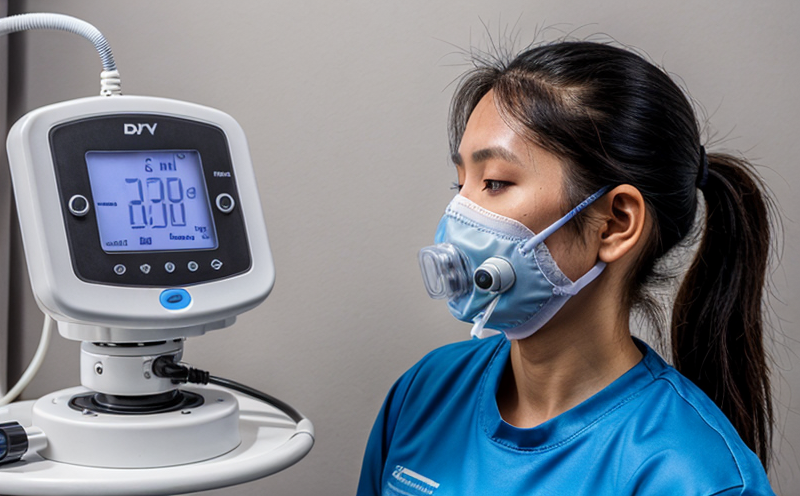ISO 5367 Breathing Tubes Tensile Strength Testing
The ISO 5367 standard provides a standardized method for determining tensile strength of breathing tubes, which are critical components in respiratory and ventilation devices. This testing is crucial to ensure that the materials used meet stringent quality and safety requirements, thereby protecting patient health.
Respiratory and ventilation device manufacturers rely on this test to validate the integrity and performance of their products under various conditions. The tensile strength of breathing tubes is a key factor in determining how well they can withstand mechanical stress during use without failure. This property ensures that the devices function effectively, preventing potential harm to patients.
The testing process involves subjecting the breathing tube specimens to controlled tensile forces until rupture occurs. Specimen preparation is critical; it requires precise cutting of the tubes into specified lengths and diameters as per ISO 5367 guidelines. The apparatus used for this test includes a universal testing machine capable of applying precisely controlled tensile forces. The machine must be calibrated regularly to ensure accurate results.
Acceptance criteria stipulate that the tensile strength should meet or exceed specific values determined by the manufacturer’s specifications. Compliance with these standards ensures product reliability and safety, which is paramount in medical devices. Failure to meet these criteria can lead to device malfunction, patient injury, or even death.
In real-world applications, the results of this test are used to optimize material selection and design for better performance. Engineers use the data from tensile strength tests to refine their designs, ensuring they can withstand anticipated stresses during use while maintaining comfort and ease of use. Additionally, this testing helps in identifying potential weaknesses in existing designs that need improvement.
Quality managers rely on consistent test results to ensure batch-to-batch consistency, which is essential for quality control. Compliance officers use these tests as part of their regulatory compliance strategies, ensuring that products meet international standards and regulations. R&D engineers benefit from this testing by gaining insights into material behavior under stress, informing new product development efforts.
Procurement teams also find value in this test, as it helps them select suppliers who consistently deliver high-quality materials. By specifying tensile strength requirements in their procurement contracts, they ensure that only reputable manufacturers supply their products.
Benefits
Ensures product reliability and safety by meeting stringent quality standards.
Improves material selection and design optimization for better performance.
Supports regulatory compliance, enabling manufacturers to meet international standards.
Aids in identifying potential weaknesses in existing designs that need improvement.
Guarantees batch-to-batch consistency for quality control purposes.
Provides insights into material behavior under stress, useful for new product development efforts.
Helps in selecting reputable suppliers who consistently deliver high-quality materials.
Eurolab Advantages
At Eurolab, we pride ourselves on providing comprehensive and accurate testing services that meet the highest international standards. Our expertise in medical device testing is unmatched, ensuring that our clients receive reliable results every time.
Our state-of-the-art facilities are equipped with advanced testing equipment, including universal testing machines calibrated to ISO 5367 specifications. This allows us to perform precise and consistent tensile strength tests on breathing tubes. Our team of experienced engineers and technicians ensures that each specimen is prepared according to the standard's exacting requirements.
We offer fast turnaround times for test results, allowing clients to quickly incorporate feedback into their product development processes. Our commitment to quality control means that we can provide consistent results across all tests conducted at our facility. This consistency is crucial for maintaining batch-to-batch reliability and meeting regulatory expectations.
Our compliance officers are well-versed in international standards and regulations, ensuring that clients’ products meet the necessary requirements. By partnering with Eurolab, manufacturers can rest assured knowing their products will comply with relevant regulations, minimizing the risk of non-compliance issues down the line.
Customer Impact and Satisfaction
Our clients benefit significantly from our ISO 5367 breathing tubes tensile strength testing services. By ensuring that their products meet or exceed the specified tensile strength requirements, we help them maintain a strong market presence and build customer trust.
Manufacturers who use Eurolab’s testing services can demonstrate compliance with international standards to regulatory bodies, which enhances their reputation in the industry. This, in turn, leads to increased sales and better brand recognition. Our clients also appreciate our fast turnaround times, allowing them to bring new products to market more quickly.
Customer satisfaction is a key metric for us at Eurolab. We regularly receive positive feedback from our clients, who praise our expertise and the reliability of our test results. Many have commented on how working with us has streamlined their product development process and improved overall quality assurance efforts.





